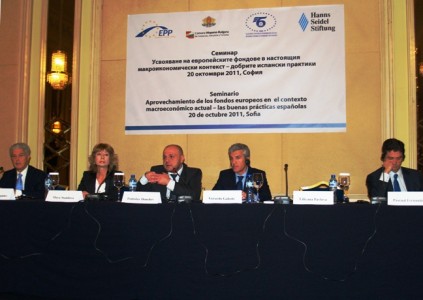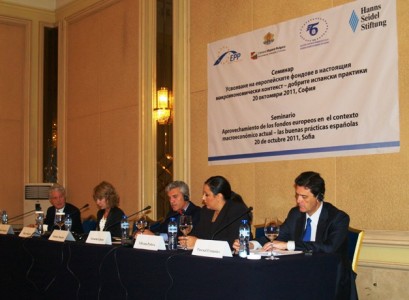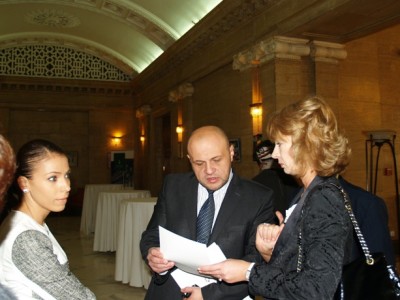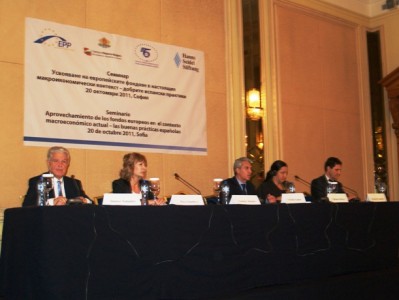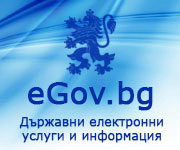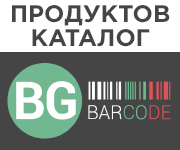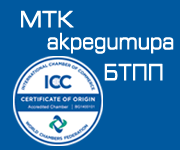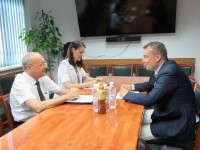Назад
Назад
European Funds – the Experience of Spain and Bulgaria
On 20 October 2011, the Bulgarian – Spanish Business Council with BCCI and the Spanish – Bulgarian Chamber of Commerce, Industry and Tourism organized a seminar “Utilization of European Funds in the present macroeconomic context – good Spanish practices”. Experts from the European Parliament and the European People’s Party took part in the seminar and shared good practices from Spain’s work with European funds. Bulgarian experience in the area was also presented by the Minister of European Funds Management and the Minister of Regional Development and Public Works of the Republic of Bulgaria.
The President of the Bulgarian – Spanish Business Council with BCCI Dimitar Pampulov opened the forum and moderated the discussion. The Honorable Chairperson of the Spanish-Bulgarian Chamber of Commerce, Industry and Tourism and Economic and Commercial Counselor at the Embassy of Bulgaria in Madrid Maya Stanilova addressed the participants and said that the Spanish experience with EU funds provides an excellent example of good practice, which has turned Spain into a major beneficiary of EU funds since 1998. This is the main factor for the country’s rapid development in the field of agriculture. It is no secret that the country applies in its governance the experience gained from the good management of EU projects.
Minister Tomislav Donchev informed that at present international relations are undergoing intensive changes aiming decentralization, which means working and maintaining relations not only on ministerial and state administration level, but on many other levels. The present seminar, organized with the assistance of joint chambers from the two countries, the European People’s Party and Hanns Seidel Foundation, proves this. He explained that the absorption of EU funds doesn’t have to do with the final amounts used only, but rather with the objectives, performance and usefulness to society. Minister Donchev said that everyone was aware that at the beginning of the first programming period for utilization of EU funds, our country wasn’t well prepared and therefore, didn’t achieve excellent results. That is why now part of the normative base is being changed, specific deadlines are defined, engagements and obligations are allocated, and excellent coordination between all participants in the process is sought.
In the middle of the first programming period 57% of the funds for our country were negotiated. 16% were paid and about 10% of the payments made to contractors under various projects were reimbursed.
Gerardo Galeote, European Affairs Adviser of the President of the Spanish People’s Party, who was one of the lecturers in the seminar, and is a former member of the European Parliament in the period 1994 – 2009, shared the Spanish experience in utilization of EU funds. In 2000 – 2007 Spain was the largest recipient of European funds, managing about 60% of the Cohesion Fund of the Union. The aid however, didn’t exceed 1% of the country’s GDP. During this period the country became the 8th largest economy in the world. Unemployment dropped by 10 points, a lot of new jobs were created. Moreover, the country welcomed many immigrants – more that all European countries together.
Mr. Galeote reviewed the expected changes in the conditions for the next programming period after 2014. In general, the budget for EU programmes will be reduced. There will be a decrease in ecology funding, but an increase of the budget for research and development. He noted that the cohesion policy must be defended, and technological factors should be taken into account in EU funds allocation.
The Minister of Regional Development and Public Works Liliyana Pavlova presented the role of Operational Programme “Regional Development” for the macro economy of Bulgaria. For the period 2007 – 2013, the Programme has a budget of 1.6 billion euros. It includes a bunch of activities for the 6 regions of the country /infrastructure, roads, healthcare, tourism, social infrastructure, culture, etc./ Over 40 grant schemes are being developed. Beneficiaries are 264 municipalities, agencies, ministries. She emphasized the water reform in the country, according to which municipalities will manage the water resources within their territory, and will build regional water treatment plants. In accordance with the Water Act, water associations will also be established.
Minister Pavlova underlined that 2012 will be a key year for all operational programmes. “We will have to pay very significant sums in order not to have to return sums without using them anymore”, she explained. She didn’t specify a percentage of payments under OP “Regional Development” but said that she hoped the sums would be the same as the ones paid the previous year.
Pascual Fernandez, Counselor on Financial Issues and Perspectives for the Programming Period 2007 – 2013 at the European Parliament and former Deputy Minister of Environment in Spain /2000 – 2004/, as well as former General Director of Regional Policy and Budget Directorate at the Ministry of Economy and Finance, presented the near-future perspectives for the European Union funds and their general budgetary and financial aspects. He shared that according to the European Commission, the cohesion policy hasn’t been applied successfully in many countries. This is understandable given that different countries have different priorities. If we view Europe as consisting of various regions – they are also very different from each other – convergence regions in which the income (purchasing power) of the population is less than 75% of the EU-25 income, “phasing-in” regions – with income of the population between 75% – 80% of the average European income, and rich regions. This division is not constant and the regions are changing.
The reason why Spain has managed to utilize 95-98% of EU finances is that the country chooses large but really important projects, which are easier to manage. There is centralization of EU funds management in the country – by the Ministry of Labour, Ministry of Agriculture (as far as agricultural funds are concerned), Ministry of Economy (Cohesion funds and Regional Development funds). Another factor for successful EU funds absorption is solving problems as soon as they appear – making changes only in the problematic units.
The seminar continued with an active discussion, with the participation of the lecturers and representatives of various Bulgarian ministries and departments, businessmen and journalists.
The President of the Bulgarian – Spanish Business Council, Dimitar Pampulov closed the seminar saying that: “A hand has been lent to us, let’s grab it and start using the experience of Spanish experts”.
20.10.2011
Още новини:
-
19-10-2011
-
17-10-2011
-
12-10-2011

 1 USD =
1 USD =  1 GBP =
1 GBP =  1 CHF =
1 CHF =  ISO 9001:2015
ISO 9001:2015